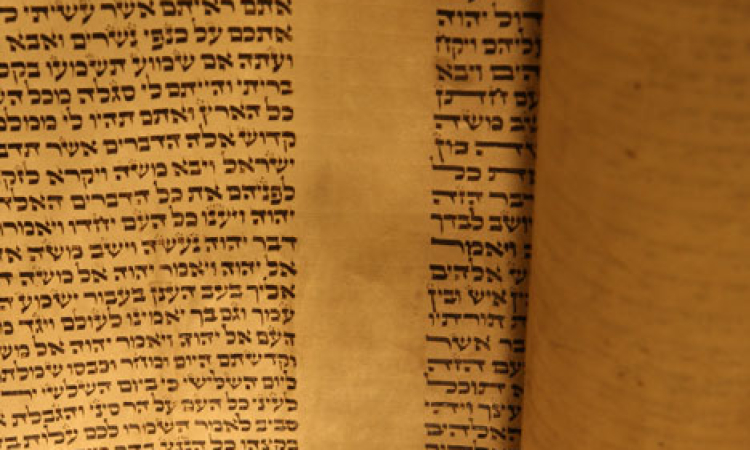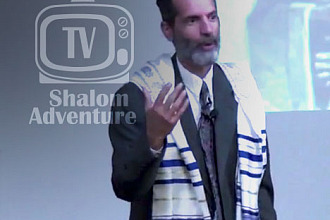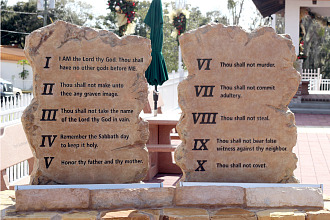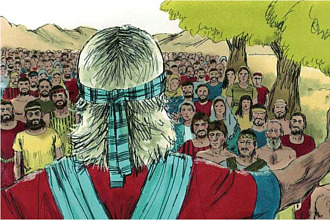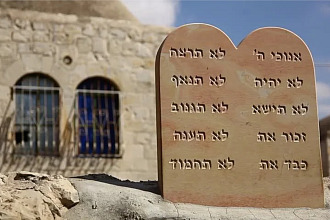Parasha for the Week: Mishpatim: Exodus 21:1 – 24:18
Haftarah for the Week: Jeremiah 33:25 –34:22
Apostolic Writings: Matthew 6:1 - 6
Overview
Israel receive a series of laws concerning social justice. Topics include:
- Proper treatment of Jewish servants.
- A husband's obligations to his wife.
- Penalties for hitting people and for cursing parents, judges and leaders.
- Financial responsibilities for damaging people or their property, either by oneself or by one's animate or inanimate property, or by pitfalls that one created;
- Payments for theft;
- Not returning an object that one accepted responsibility to guard;
- The right to self-defense of a person being robbed.
- Prohibitions against seduction; witchcraft, bestiality and sacrifices to idols.
- The Torah warns us to treat the convert, widow and orphan with dignity, and to avoid lying.
- Usury is forbidden and the rights over collateral are limited.
- Payment of obligations to the Temple should not be delayed, and the Jewish People must be holy, even concerning food.
- The Torah teaches the proper conduct for judges in court proceedings.
- The commandments of Shabbat and the Sabbatical year are outlined.
- Three times a year—Pesach, Shavuot and Succot—we are to come to the Temple.
- The Torah concludes this listing of laws with a law of kashrut.
G-d promises that He will lead the Jewish People to the Land of Israel, helping them conquer its inhabitants, and tells them that by fulfilling His commandments they will bring blessings to their nation. The people promise to do and listen to everything that G-d says. Moshe writes the Book of the Covenant, and reads it to the people. Moshe ascends the mountain to remain there for 40 days in order to receive the two Tablets of the Covenant.
"Categories of Laws"
Rabbi Zalmen Marozov says to us the different category of the commandments. He says “The 613 mitzvot fall into several general categories. They can be generalized as positive mitzvot (actions we need to perform) and negative mitzvot (prohibitions we should avoid).
We can also place the mitzvot in the three general groups: Eidut, Chukim, and Mishpatim.
Eidut are “testimonies.” These Mitzvot serve as a “sign” between us and G-d. For example, resting on Shabbat reminds us that G-d rested on the seventh day. Passover reminds us of the miracle of the Exodus.
Chukim are Mitzvot which have no apparent logical reason. Examples include the Kashrut laws, the prohibition of eating pork, or of wearing wool and linen in one garment, etc.
Mishpatim are mostly laws of civil justice. These laws fall within the realm of human logic and reason. In fact, many secular societies contain similar laws.
“How to Increase Our Sensitivity”
The Torah states, “And if a man shall open a pit or if a man shall dig a pit and not cover it, and an ox or donkey will fall in it, the owner of the pit shall pay.” (Exodus 21:33-34) The Torah tells us in this parasha the laws pertaining to damages caused by one’s animals and damages caused by one’s digging a hole in the ground. Rabbi Lebovitch used to say that it is very easy just to look at these laws in terms of financial obligations. In some instances we are legally obligated to pay for damages and in other instances we are free from having to pay.
Rabbi Packouz says that the proper way to view the laws of damages is from the perspective of the Chinuch the foundation of the laws pertaining to damages is the mitzvah of loving our fellow human being. When we care about others, we will be careful not to do anything that will cause them damage or suffering. When kind and compassionate people study these laws they do not think in terms of how much money they will have to pay, but in terms of what they can do to avoid causing others any loss or pain. Studying these sections of the Torah in the proper way will increase our sensitivity to the possibilities of harming others. The Talmudic sage Rabbi Akiva explains the Torah commandment of “Love your fellow as yourself,” as follows: “What you don’t want done to you, don’t do unto others!”
“The Gift of the Two Tables”
The Torah states, “The L-rd said to Moses, ‘Come up to me on the mountain and stay here and I will give you the tablets of stone, with the law and commands I have written for their instruction.’ and the glory of the L-rd settled on Mount Sinai. For six days the cloud covered the mountain, and on the seventh day the L-rd called to Moses from within the cloud. To the Israelites the glory of the L-rd looked like a consuming fire on top of the mountain. Then Moses entered the cloud as he went on up the mountain. And he stayed on the mountain forty days and forty nights.” (Ex. 24:12, 16-18.)
Most of the scholars today doubt about the divine origin of the Torah, and even that Moshe was the author of the entire Torah. Scholars are used to cut the Torah in small portions saying that this portion and this one were not written by Moses but in different period of the Jewish history. It is important to read these verses of parasha Mishpatim where Moses stayed on the mountain for 40 days and 40 nights. It is interesting to read that it was not only 40 days, but also 40 nights, that means we cannot read this text as symbolic with symbolic numbers. Moses really stayed 40 days of 24 hours on the mountain. These 40 days and 40 nights that Moshe spent on Mount Sinai were used by G-d to teach him the entire Torah from Genesis (Bereshit) to Deuteronomy (Devarim) and its commandments.
"Learning Torah"
One of the 53 laws-mitzvot in this week's Parsha, Mishpatim, is the commandment to help the poor and needy whether through charity or a loan. The Torah states, "When you will lend money to My people, to the poor with you, you shall not press him, neither shall you place upon him interest... for when he will cry to Me, I will hear for I am merciful." The mitzvah of helping people in need is called "Gemilat Chasadim"—"performing deeds of kindness." Gemilat Chasadim, according to our sages, is in a way even greater than charity (Tzedakah). Charity is only for the poor, whereas, the mitzvah of Gemilat Chasadim, helping through a loan, applies to anyone in need.
Haftarah: Jeremiah 33:25 – 34:22
Haftarah: The prophecy given to Jeremiah was when the Babylonians wanted to destroy Jerusalem and to deport its inhabitants: "The word that came to Jer¬emiah from the LORD, when King Nebuchadrezzar of Babylon and all his army and all the kingdoms of the earth and all the peoples under his dominion were fighting against Jerusalem and all its cities" (Jeremiah 33:26).
God said to the King of Judah that Babylon will have victory over Israel and the King will be deported too. "Thus says the L-RD, the God of Israel: Go and speak to King Zedekiah of Judah and say to him: Thus says the L-RD: I am going to give this city into the hand of the king of Babylon, and he shall burn it with fire. you yourself shall not escape from his hand, but shall surely be captured and handed over to him" (Jeremiah 34:2-3). However, the L-rd loves his people and will continue to love him, the deportation is a way G-d used to help Israel to understand their mission towards the nations, to be a light to the nations and to help each individual to believe in the only one G-d. Thus before giving the reasons of this defeat, God assured Israel that he will bring them back to their country: Thus says the L-RD: Only if I had not established my covenant with day and night and the ordinances of heaven and earth, would I reject the offspring of Jacob and of my servant David and not choose any of his descendants as rulers over the offspring of Abraham, Isaac, and Jacob. For I will re¬store their fortunes, and will have mercy upon them. (Jeremiah 33:25-26)
Apostolic Writings: Mark 14:60 - 72
Besorah: Yeshua is on trial, the Cohen Gadol asks him a crucial question: "Are you the Messiah, the Son of the Blessed One?" (Mark 14:61) Yeshua gives an clear and unambiguous answer to the Cohen Gadol: "I am; and 'you will see the Son of Man seated at the right hand of the Power,' and 'coming with the clouds of heaven." (Mark 14:62).
Parasha: The Torah states, "You shall not curse a judge, and a ruler among your people you shall not curse." (Exodus 22:27).
Besorah: Yeshua was respectful. He knew what the Torah said and did not want to curse the judge or even to speak badly about him. "Y'shua made no further reply." (Mark 15:5). During his trial Yeshua was that lamb described by the prophet Isaiah some 800 years before. "He was despised and rejected by others; a man of suffering and acquainted with infirmity; and as one from whom others hide their faces he was despised, and we held him of no account." (Isaiah 53:3) In our text of the Besorat-Yeshua Peter denied his master saying: "I do not know or understand what you are talking about." (Mark 14:68). The prophet announced also this denial: All we like sheep have gone astray; we have all turned to our own way, (Isaiah 53:6)

